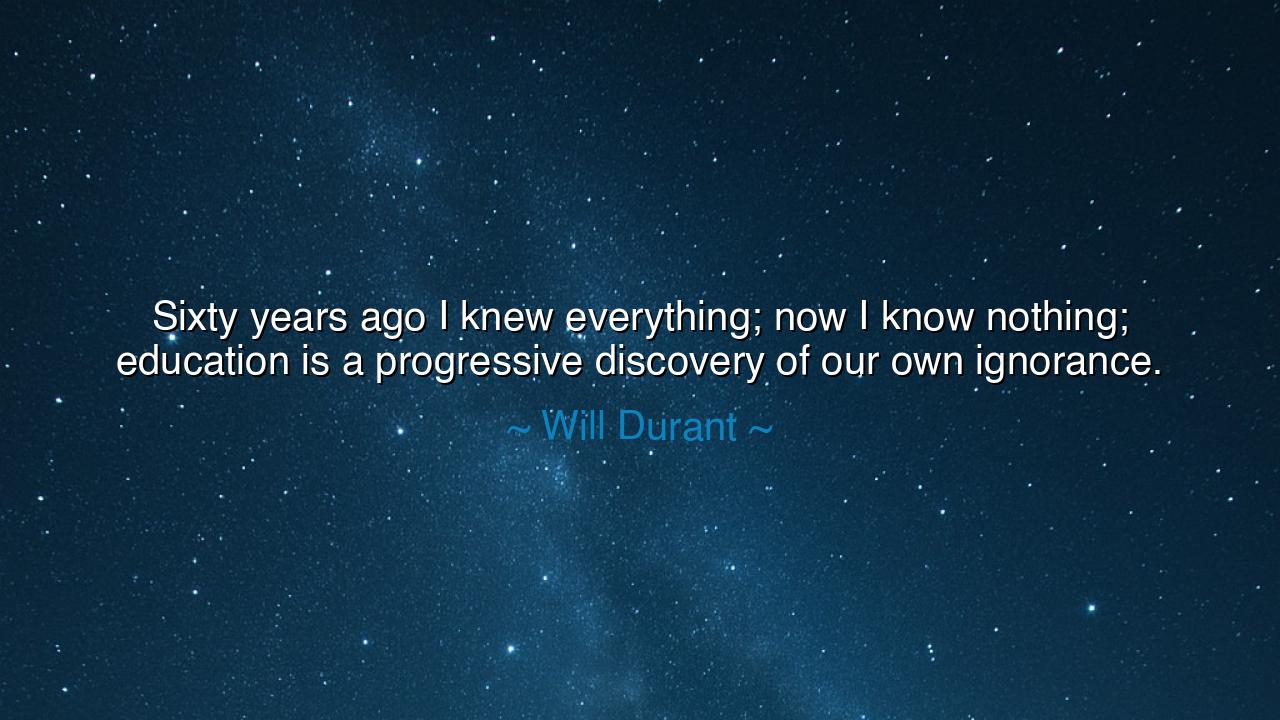
Sixty years ago I knew everything; now I know nothing; education
Sixty years ago I knew everything; now I know nothing; education is a progressive discovery of our own ignorance.






Hear, O seekers of wisdom, the words of Will Durant, historian, philosopher, and teller of mankind’s story: “Sixty years ago I knew everything; now I know nothing; education is a progressive discovery of our own ignorance.” These words are not spoken in jest, though they carry humor, but in humility, born of a lifetime spent searching the depths of history and thought. They reveal the paradox of true wisdom: that the more we learn, the more we realize how little we know.
The origin of this utterance lies in Durant’s long journey as a historian, where he and his wife Ariel chronicled the rise and fall of civilizations. After decades of study, after gathering the knowledge of empires, religions, wars, and philosophies, Durant confessed not certainty but humility. For every question answered, a thousand more arose. For every truth revealed, a greater mystery loomed beyond it. Thus he declared that education is not the filling of the mind with facts, but the unending unveiling of our own ignorance, which teaches us reverence for the vastness of truth.
Consider, O listener, the example of Socrates, the philosopher of Athens. When accused of wisdom, he replied that his only wisdom was knowing that he knew nothing. This humility, this recognition of ignorance, was not weakness but strength, for it opened the soul to learning. Socrates, like Durant, understood that to cling to the illusion of complete knowledge is to close the door of growth, while to admit ignorance is to fling it wide open. Thus the wisest men are often those most willing to say, “I do not know.”
Look also to the tale of Isaac Newton. After discovering the laws of motion and the force of gravity, he declared himself but a child playing with shells on the shore, while the great ocean of truth lay undiscovered before him. Newton’s admission mirrors Durant’s: the greatest discoveries do not end the pursuit of knowledge, but deepen the mystery. The horizon of wisdom moves ever further as we approach, reminding us that ignorance is not shameful but the starting point of every new journey.
Durant’s words also carry a warning for the young, who, like himself in youth, believe they “know everything.” Youthful confidence is swift, but it is shallow. Time, study, and life itself humble the soul, teaching that certainty often conceals blindness. To discover one’s ignorance is painful, but it is also liberating, for it clears the fog of arrogance and makes way for true learning.
The lesson is plain: the path of education is endless, and its truest gift is not pride but humility. Every book read, every truth uncovered, every experience lived reminds us of the vastness we do not know. This humility is not despair, but strength—it urges us to keep learning, to keep seeking, to keep growing. The proud claim, “I know,” but the wise confess, “I am still learning.”
Practical actions lie close at hand. Approach study not as one seeking to master all things, but as one eager to be transformed. When you learn, ask not only, “What do I now know?” but also, “What greater mystery does this reveal?” Encourage in children not only the pursuit of answers, but the courage to admit when they do not know. In your own life, let humility guide you: listen deeply, question earnestly, and never assume you have reached the end of wisdom.
So let Durant’s words echo in your heart: education is the noble art of discovering our own ignorance. To know that we do not know is the beginning of wisdom; to seek despite our ignorance is the path of greatness; to remain humble in all learning is the crown of the wise. Walk this path, and you will find that ignorance, far from being a curse, is the very fire that drives the eternal quest for truth.






AAdministratorAdministrator
Welcome, honored guests. Please leave a comment, we will respond soon